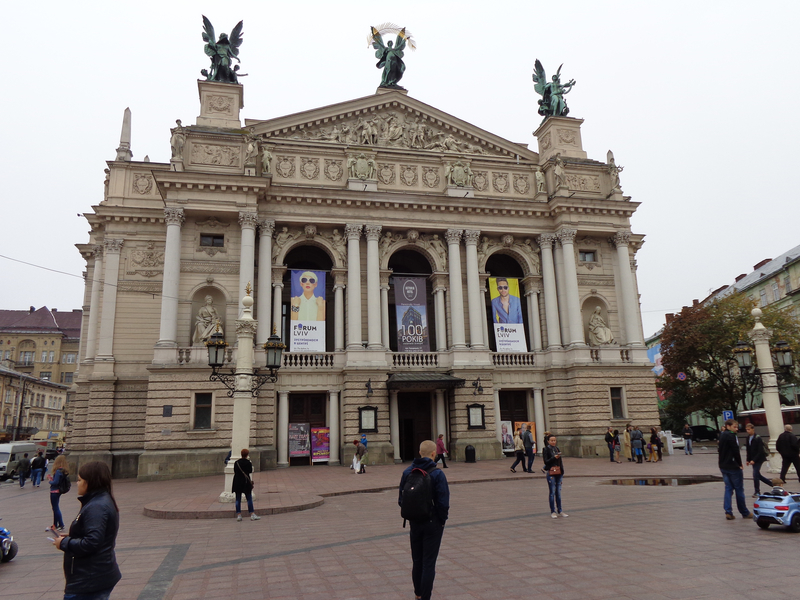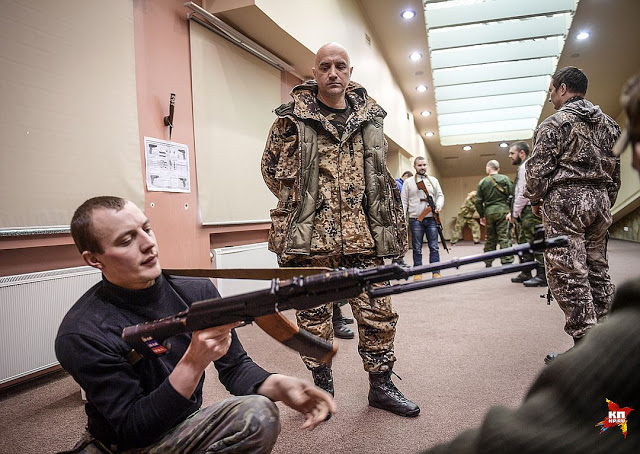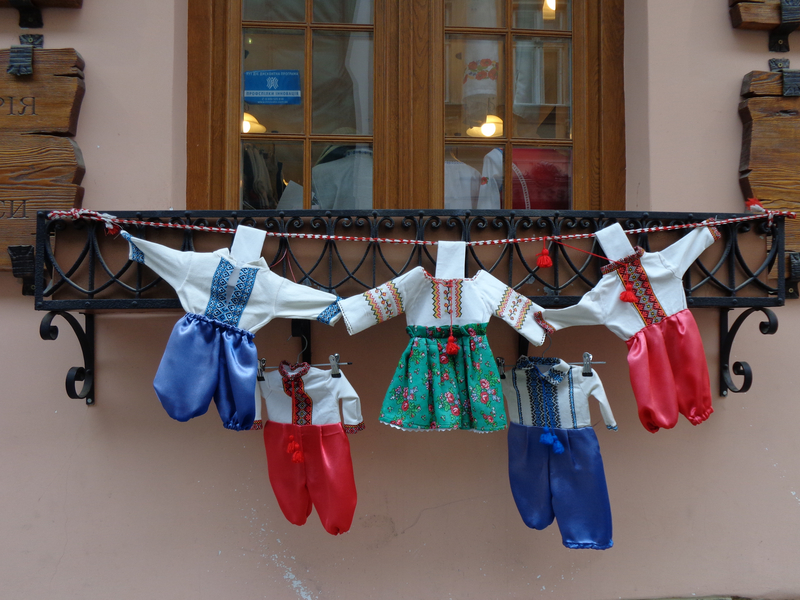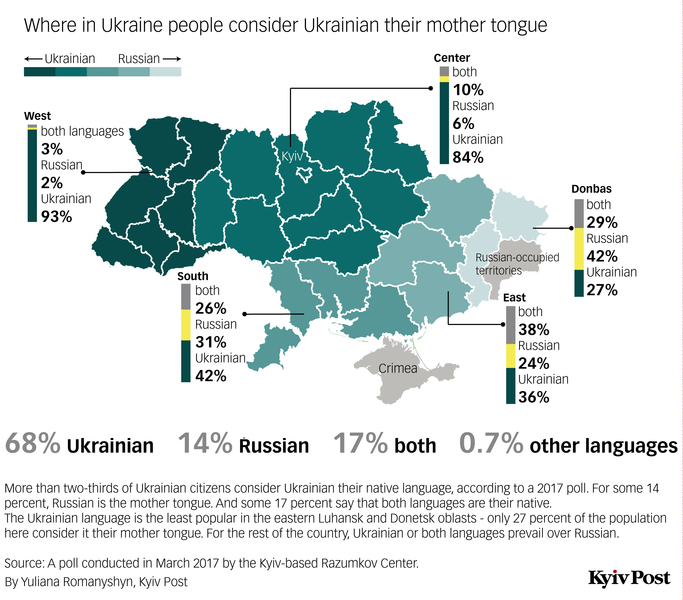The Lviv regional council on September 18 put a ban on Russian-language cultural products, that has drawn a lot of criticism in and outside Ukraine. Russia reacted furiously. West-Ukraine is the most anti-Russian part of the country, incorporated in the USSR only after World War II. Most Ukrainians are bilingual but Ukrainian is on the rise since the war with Russia, says Larissa Babij from Hromadske International.
 The Opera of Lviv. West-Ukraine became part of the USSR only after WWII and is the most anti-Russian part of the country (pictures Laura Starink)
The Opera of Lviv. West-Ukraine became part of the USSR only after WWII and is the most anti-Russian part of the country (pictures Laura Starink)
by Larissa Babij
Ukraine’s western region of Lviv is soon to become less visibly Russian. At least, this is stipulated in a new moratorium on the public use of Russian-language cultural products throughout the region. The measure was approved on September 18 by the Lviv regional council and is effective 'until the full end to the occupation of Ukraine’s territory'.
The measure’s initiators have called it a defensive action in Russia’s hybrid war against Ukraine, which since 2014 has taken away over 10,000 lives. But the moratorium, along with the polarized reaction it evoked, highlights the diversity of positions regarding language within Ukraine.
The Ukrainian constitution states that Ukrainian is the sole official language in the country while guaranteeing the free development and use of languages of other national minorities, such as Russian, Yiddish, Romanian, Belarusian, Crimean Tatar, among others. The majority of Ukrainians can speak both Ukrainian and Russian and freely switch between the two. Yet the division between Ukraine’s 'Ukrainian speakers' and 'Russian speakers' has often been exaggerated for political ends. It was one of the justifications for Russia’s illegal annexation of Crimea in March 2014 and subsequent military intervention in eastern Ukraine given by Russian president Vladimir Putin.
'We were forced to protect the Russian-speaking population in the Donbas, forced to respond to the aspirations of the people who live in Crimea to rejoin the Russian Federation,' Putin explained at a forum on October 12, 2016 in Moscow.
Lviv and the surrounding region are home to many soldiers (both enlisted and drafted) fighting Russia-backed separatists in Ukraine’s Donbas region. Since 2014, it has also become home to many Ukrainian citizens displaced by the war, who often speak Russian or Crimean Tatar as their native language. Historically a multiethnic city, today Lviv has found itself in the center of language controversy.
What’s in the Law?
Perhaps most of the controversy caused by the moratorium stems from the unclarity that it first carried. When it was approved on September 18, the only information about the decision could be found in the decision’s project, which stated a 'moratorium on public use of Russian-language cultural products in any form across the territory of the Lviv region until the end of occupation of Ukrainian territory'. A special interdisciplinary working group was established – including citizens, law enforcement and local government administrations – to clarify what this moratorium would actually mean for individuals and legal entities.
However, days after the moratorium was announced and a few words of international condemnation later, Lviv council representatives showed a much softer approach to the changes about to be introduced.
'This is not a direct prohibition but a recommendation,' said Lviv regional council Director of Affairs Valentyn Kharlov. 'We recommend refraining from public demonstration of cheap Russian cultural products until the end of the military conflict.'
 Russian writer Zakhar Prilepin (standing, in battle dress) identifies himself with the pro-Russian separatists in Donbass
Russian writer Zakhar Prilepin (standing, in battle dress) identifies himself with the pro-Russian separatists in Donbass
Contrary to initial speculation that all Russian-language books, films, and music would be banned from the Lviv region, local lawmakers have only forbidden the songs of people 'involved in anti-Ukrainian activities', specifically those 142 individuals named by Ukraine’s Ministry of Culture and Security Service as posing a threat to national security.
These individuals are primarily Russian musicians, actors and writers, but also international celebrities like actor Gerard Depardieu and American rock star Fred Durst, who 'speak out in support of violating the territorial integrity and sovereignty of Ukraine' or continue to perform in occupied Crimea or in separatist-controlled parts of the Donbas.
Therefore the songs of a Russian rock band, whose leader has condemned Russia’s actions in the Donbas and Crimea, will not be banned, explained Kharlov, nor will Russian literature from centuries past or children’s books.
Indignant response
International diplomats, including the Canadian and British ambassadors to Ukraine, were quick to criticize the measure, stressing the need for tolerance and diversity.
'The Lviv [region] ban as formulated is narrow-minded, discriminatory and just plain dumb,' Roman Waschuk, Canadian Ambassador to Ukraine wrote on Twitter on September 19, the same day the changes were announced. 'And I say this as a diasporic native speaker of Ukrainian, and consistent advocate of affirmative action for cultural products in that language – but also diversity.'
American historian Marci Shore, author of The Ukrainian Night (a book about the Euromaidan protests), stresses that the Russian language does not belong to Putin; language belongs to everyone.
'Languages should never be banned anywhere. Languages should never be purged, only added,' she says. 'I’ve long been fascinated by – and jealous of – Ukrainians’ ability to [switch between languages].'
While in Ukraine, where about 68% consider Ukrainian their native language as opposed to 14% who give that status to Russian, the decision was mostly criticized by opposition politicians, such as former member of Viktor Yanukovych’s Party of Regions Yevhen Murayev.
Vladislav Davidzon, chief editor of The Odessa Review, an English-language journal covering contemporary Ukraine called the ban 'ridiculous and illiberal'. 'It is a symbolic gesture of one regional council out of two dozen, but it doesn’t do very much to signal to outsiders that the country is on the path of liberal democracy, which in many ways it is,' he said.
 Ukrainian vyshivanki (embroidery) in the streets of Lviv
Ukrainian vyshivanki (embroidery) in the streets of Lviv
Lviv residents have mixed reactions to the new Russian-language moratorium. Some support it, others deem it too radical, while a lot are just confused about what it means and how it will be enforced.
'The only thing that I don’t understand from this decision is how they’re going to monitor where Russian pop music is played, who will be in charge of this [process]…whether there will be fines or prosecution,' Lviv local Sviatoslav Drabchuk told tv-station Hromadske. 'They just approved a decision...The council members didn’t discuss any further steps at all.'
Implementation
Officials from the Lviv regional council did admit that punishing violators of the moratorium is something that lies outside their purview. However, council members suggested that responsibility for making sure the measure is followed will fall to local police departments. Representatives of the national police and patrol police in the Lviv region told Hromadske that they will be looking out for violations of the moratorium but did not say how they would be punished.
Yuriy Hanushchak, a former MP involved in formulating Ukraine’s decentralization reforms, says the Lviv regional council did not have the right to pass this resolution. 'It is an illegal decision,' he maintains. 'They cannot require local governing bodies [to enact this ban] as per Article 19 [of Ukraine’s constitution]. Even more so, they cannot authorize the national police [to act on this ban] as this would be a show of feudalism.'
At the same time, the regional council’s act sets a dangerous precedent that other local governing bodies could be tempted to follow, he adds. 'Passing unlawful resolutions fractures the state,' says Hanushchak, adding that this act provides an argument for members of the Ukrainian government who say that the country has gone too far in the way of decentralization.
'Passing unlawful resolutions fractures the state,' says Hanushchak, adding that this act provides an argument for members of the Ukrainian government who say that the country has gone too far in the way of decentralization.
Ukraine’s Linguistic Landscape
The idea of Ukraine as a country divided by language and culture between east and west grossly oversimplifies the reality of a country with numerous regions, each with its own cultural and linguistic traditions and nuances.
Historically, over centuries of rule by foreign empires, Ukrainian was spoken primarily in the villages, while imperial languages like Russian (in what is now the country’s center and east) and Polish and Hungarian (in the west) dominated city life. In the Soviet Union, Russian was the language of official documents, scholarly writing, and by the 1930s – popular culture.
Today more than 80% of Ukraine's citizens are bilingual, according to anthropologist Monica Eppinger, and in everyday life Ukrainians switch between Ukrainian and Russian depending on context.
In 2017, the Razumkov Center found that about 68% of Ukrainians polled said Ukrainian was their native language, while 14% chose Russian, and 17% claimed both Ukrainian and Russian as native languages. Ten years ago the figures were as follows: Ukrainian 44%, Russian 26%, both 29%.
In an informal street survey conducted by RFE/RL last year in the capital city of Kyiv, most respondents called Ukrainian their native language, adding that they often use Russian in everyday communication, including with family and friends.
Now over 80% of Ukrainians in the country’s southern and eastern regions feel comfortable speaking, listening to and reading in the Ukrainian language, according to a poll by market research company GfK (with support from USAID) for Ukraine’s Institute of Mass Information. The survey also found an increase in use of Ukrainian-language media (internet, television, radio, press) and decrease in exclusive use of Russian-language sources from 2016 to 2017.
Most respondents listen to and watch a mix of Ukrainian- and Russian-language TV and radio, while the majority still use Russian-language sources more than Ukrainian in internet and press.
National Language Policy
One potential consequence of the Lviv regional council’s action is speeding up the passage of national legislation that clarifies state language policy. The country’s only language policy law, passed in 2012 amidst great controversy, was declared unconstitutional last February.
It had allowed for official bilingualism in regions where ethnic minorities make up at least 10% of the local population, and, as a result, 13 of Ukraine's 25 regions adopted Russian as a second official language. At the same time, the law failed to protect the development of Ukrainian as the sole official language by giving Russian equal status in a number of aspects of public life.
Since 2017, Ukrainian is by law the language of education, with all subjects from 5th grade onward taught in the state language. Film industry regulations and legislation on television and radio broadcasting also include quotas aimed at encouraging production of Ukrainian-language material. For example, in November, the percentage of songs played on Ukrainian radio stations that should be in the state language will increase from 30% to 35%.

The language policy bill currently under consideration in Parliament declares Ukrainian the sole official language, and that a multiplicity of languages provokes linguistic discord. It requires that every citizen of Ukraine be proficient in Ukrainian. The law also lists official and professional positions where people must speak Ukrainian. According to the new law, language cannot be regulated at a local level.
This bill may go up for vote in Parliament as early as the beginning of October.
With reporting by Vasyl Pekhno, Yarema Chuyko of Hromadske
